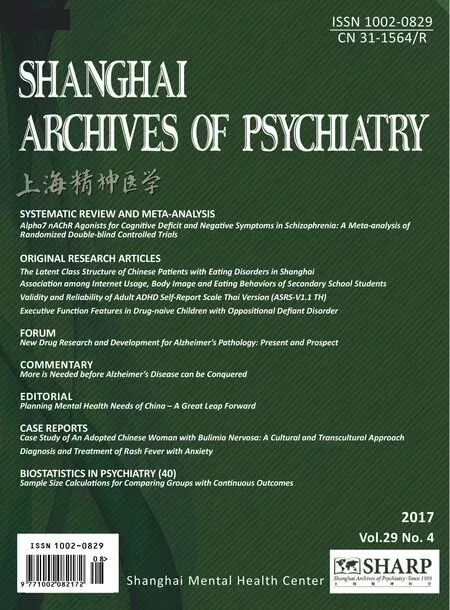Planning Mental Health Needs of China – A Great Leap Forward
Kua Ee HEOK*
[Shanghai Arch Psychiatry. 2017; 29(4): 242. doi: http://dx.doi.org/10.11919/j.issn.1002-0829.217092]
•EDITORIAL•
Planning Mental Health Needs of China – A Great Leap Forward
Kua Ee HEOK*
[Shanghai Arch Psychiatry. 2017; 29(4): 242. doi: http://dx.doi.org/10.11919/j.issn.1002-0829.217092]
It is an enormous challenge to plan the mental health needs of China. Professor Wang[1]and Professor Xie[2]have outlined broad strategies focusing on clinical services and the shortage of mental health professionals.
The National Mental Health Plan may also need to address urgent mental health issues related to the ageing of the population in China and the rising tide of dementia.[3] Professor Sartorius commenting on Professor Wang’s paper mentioned about dementia as a major contribution to the burden of disability in China.[4]Besides planning services for the elderly, it is equally important to introduce dementia prevention programmes to stem the tide. The Singapore experience has shown that it is possible to implement such a programme in the community.[5,6]In fact,in the Singapore study, all the elderly are Chinese whose forefathers came from southern China. The programme also addresses prevention of depression,hypertension and diabetes mellitus which are risk factors for dementia. Although the programme focuses on dementia, our research shows that the prevalence and incidence of depression are much higher than dementia.[7]Depression is a risk factor for suicide in the elderly.
Improving psychiatric education has been emphasized in China lately. In recent years, a team of overseas professors of psychiatry and local Chinese professors have organised Teachers of Psychiatry (TOP)workshops in Beijing, Shanghai and Chengdu.[8]The TOP workshops are to train psychiatrists to improve clinical service, teaching and research. The focus is on acquiring skills in planning and assessing outcome of clinical services and teaching programmes, and on how to conduct and write research projects.
We look forward to the successful implementation of the National Mental Health Plan and hope to read the outcome results in future publications.
Funding statement
None
Conflict of interest statement
The author reports no conflict of interest related to this manuscript.
1. Wang X. Objectives of China and the global mental health work plan. Shanghai Arch Psychiatry. 2017; 29(2): 111-112.doi: h tt p://dx.doi.org/10.11919/j.issn.1002-0829.216100
2. Xie B. Strategic mental health planning and its prac ti ce in China: retrospect and prospect. Shanghai Arch Psychiatry.2017; 29(2): 115-119. doi: http://dx.doi.org/10.11919/j.issn.1002-0829.217025
3. Feng L, Chiu HFK, Chong MY, Yu X. Dementia in Chinese populations – current data and future research. Asia Pacific psychiatry. 2011; 3: 109-114. doi: http://dx.doi.org/10.1111/j.1758-5872.2011.00137.x
4. Sartorius N. The current situations and needs of mental health in China. Shanghai Arch Psychiatry.2017; 29(2): 113-114. doi: http://dx.doi.org/10.11919/j.issn.1002-0829.216029
5. Wu DX, Feng L, Yao SQ, Xian FT, Mahendran R, Kua EH.The early dementia prevention programme in Singapore.The Lancet Psychiatry. 2013; 1: 9-11. doi: https://doi.org/10.1016/S2215-0366(14)70233-0
6. Rawtaer I, Mahendran R, Yu J, Fam J, Feng L, Kua EH.Psychosocial interventions with art, music, tai-chi and mindfulness for subsyndromal depression and anxiety in older adults: a naturalistic study in Singapore. Asia Pacific psychiatry. 2015; 7: 240-250. doi: https://doi.org/10.1111/appy.12201
7. Kua EH. Colours of Ageing – 30 Years of Research on the Mental Health of the Singapore Elderly. Write Edition.Singapore; 2017
8. Wang Y, Chen WJ, Li YY, Wang ZY, Chen J, Xu YF. Teachers of psychiatry meeting in Shanghai: a leadership training course. Asia Pacific Psychiatry. 2012; 4: 87-89. doi: https://doi.org/10.1111/j.1758-5872.2011.00171.x

Dr Kua Ee Heok, MBBS, MD, FRCPsych, is the Tan Geok Yin Professor of Psychiatry and Neuroscience at the National University of Singapore. He was trained as a doctor at the University of Malaya (Kuala Lumpur) and received training in psychiatry at Oxford University (UK) and geriatric psychiatry at Harvard University (USA). A member of the World Health Organisation team in the global study of dementia, he was invited to address the United Nations in New York in a world forum on depression. He is a former President of the Pacific Rim College of Psychiatrists, and CEO and Medical Director of the Institute of Mental Health, Singapore.
National University of Singapore, Singapore
*correspondence: Kua Ee Heok; Mailing address: Kent Ridge Road, NUHS Tower Block, Level 9, Singapore; Postcode: 119228; E-Mail: pcmkeh@nus.edu.sg
- 上海精神医学的其它文章
- Sample Size Calculations for Comparing Groups with Continuous Outcomes
- Diagnosis and Treatment of Rash Fever with Anxiety
- Case Study of An Adopted Chinese Woman with Bulimia Nervosa: A Cultural and Transcultural Approach
- More is Needed before Alzheimer’s Disease can be Conquered
- New Drug Research and Development for Alzheimer’s Pathology:Present and Prospect
- Executive Function Features in Drug-naive Children with Oppositional Defiant Disorder

